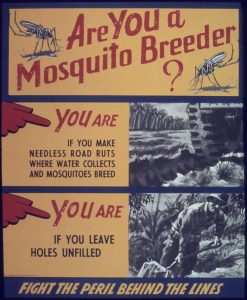West Nile Virus found in Washtenaw County - report dead birds

World War II era pamphlet aimed to discourage creation of stagnant water. Photo: U.S. National Archives and Records Administration.
Last week Washtenaw County Public Health encouraged residents to take measures to reduce the spread of West Nile virus. This warning was prompted by a dead green heron found in the Ypsilanti area testing positive for West Nile. High numbers of dead birds can indicate that the virus is active in a particular area, so report any dead birds you find. Report dead birds at the State of Michigan Sick or Dead Bird & Mammal Reporting Website: https://secure1.state.mi.us/ors/Survey/4.
West Nile is a mosquito-borne virus that can cause mild illness (West Nile fever) or severe symptoms (encephalitis or meningitis, an inflammation of the brain) in humans and other animals. West Nile is primarily transmitted through the bite of an infected mosquito. Mosquitoes become infected with West Nile when they feed on infected birds that carry the virus in their blood.
Washtenaw County Public Health reports that no human cases have yet been identified in Michigan in 2017. But in 2016, there were 43 human cases and three deaths in Michigan. Washtenaw County had two human cases and no deaths.
“We’ve seen West Nile in Michigan for the past 16 years,” says Laura Bauman, epidemiology manager with Washtenaw County Public Health. “When summer comes around, it is always important to take steps to prevent mosquito bites and the spread of the virus.”
Follow these tips from Washtenaw County Public Health to keep yourself and your family safe:
- Mosquitoes need water in which to lay their eggs, so eliminate standing water around your home and yard. Get rid of old tires, tin cans, buckets, drums, bottles or any water-holding containers. Fill in or drain any low places (puddles, ruts, etc.) in the yard. Keep drains, ditches and culverts free of weeds and trash so water will drain properly. Empty plastic wading pools at least once a week and store indoors when not in use. Unused swimming pools should be drained and kept dry during the mosquito season. Change the water in pet dishes, horse troughs, birdbaths and plant pots or drip trays at least once each week.
- Use personal protection measures to prevent mosquito bites. Wear long sleeves, long pants, shoes and socks. Spray clothing with insect repellent, as mosquitoes may bite through thin clothing. Read repellant labels carefully and follow instructions.
- Be sure to continue these precautions throughout the summer and fall. August and September are the months of greatest risk to humans for becoming infected with West Nile in Michigan. For more information, as well as a chart of current virus activity, visit http://westnile.ewashtenaw.org.








You must be logged in to post a comment Login